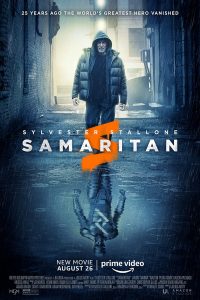Lift Up the Receiver, I’ll Make You a Believer: Josh Pearce and Arley Sorg Discuss The Black Phone
 Finney and Gwen (Mason Thames and Madeleine McGraw) are siblings in 1978 Colorado. Finney is a shy boy who wants to be tougher than he is, including wishing he had the nerve to get between his tougher younger sister and their physically and mentally abusive alcoholic father. The kids have to navigate their relationship to each other while dealing with bullies at school and the potential psychic abilities Gwen seems to be developing. Meanwhile, kids have been disappearing. It seems almost unreal to the siblings and their classmates, who tell each other the expected stories – until kids they actually know get grabbed, including Finney’s friend and school-yard protector. This changes everything. And everything changes again when the kidnapper targets Finney.
Finney and Gwen (Mason Thames and Madeleine McGraw) are siblings in 1978 Colorado. Finney is a shy boy who wants to be tougher than he is, including wishing he had the nerve to get between his tougher younger sister and their physically and mentally abusive alcoholic father. The kids have to navigate their relationship to each other while dealing with bullies at school and the potential psychic abilities Gwen seems to be developing. Meanwhile, kids have been disappearing. It seems almost unreal to the siblings and their classmates, who tell each other the expected stories – until kids they actually know get grabbed, including Finney’s friend and school-yard protector. This changes everything. And everything changes again when the kidnapper targets Finney.
Arley: What did you think of The Black Phone?
Josh: Surprisingly not shitty. That’s my one-line review.
Arley: Given how many movies we diss on for an hour and a half and then try to condense into a much shorter review, that’s not a bad review at all.
We’ve said this before, but it really does make a bigger difference with some movies: the less you know going in, the more you’ll probably enjoy this one. The evocative posters and opaque ads are enough to figure out if you’re generally interested, leaving a lot of the cool stuff as surprises for the viewing journey. Horror as a category is often misrepresented or misunderstood. Yes, “horror” can describe slasher flicks, or campy special effects, or a series of cheap jump scares. “Horror” can also describe a work which is atmospheric and moody, with moments of high tension or discomfort, and this kind of horror often explores commonly held fears or traumas. This latter definition better describes The Black Phone.
Be warned: some spoilers follow, but we’ll try to keep them minimal.
Josh: I’d seen a poster with Ethan Hawke’s face, which was creepy. And I knew Cargill was involved. When I realized it was based on a story by Joe Hill, I thought, “That explains so much.”
Arley: I’d seen some previews, which showed a kid in a room. With horror movies, when there’s just one character involved, you know that they are going to make it for at least most, if not the entire movie. There’s no suspense! For me those kinds of movies are usually boring.
Josh: You need a body count.
Arley: Yeah. Thrillers and horror movies, I’m like, you need a handful of fools, a body count, and ideally write it so you can’t tell who the central protagonist is, or at least who’s going down next. That way the viewer likes multiple people and really anybody might die. Anyways, I did see a preview of this, but it was a better film than I expected it to be, because I expected it to be some dull-ass shit.
If you’re familiar with Joe Hill’s work (or Stephen King for that matter, Joe’s dad) you’ll find many of the motifs and story elements familiar. Set in Denver, it still has that smaller town feeling to it, focused on a specific area with shots that showcase suburban looking rows of houses. Kids are often the protagonists slash set pieces slash victims in both authors’ oeuvre, and Joe’s book NOS4A2/NOS4R2 even features kids calling the protagonist on a land line. Kids with psychic powers meets ghosts/monsters/other supernatural stuff? Check. Kids who have to solve some kind of problem? Check. Even the era is a setting element that both authors seem to enjoy visiting.
But they aren’t the only ones. Director Scott Derrickson and writer C. Robert Cargill also put together Sinister (also starring Hawke): again, creepy kids, suburban vibe, atmospheric horror. Derrickson has spoken in a number of interviews about these elements and more – worth a read, after you’ve already seen the movie. Basically, these guys all share similar interests, aesthetics, and perspectives.
Josh: When you get into the actual story, there’s this thing about Stephen King and Joe Hill, especially with novellas, where they ride a line between just being crime fiction and being horror. And this is a good example, where the supernatural elements were almost unnecessary. I think I might have enjoyed it a little bit more if that was what the story was: the boy trying to get out of the room based on everything he observes by himself, not what the ghosts are telling him. And then the sister trying to find where the house is based on things she’d seen and heard, and not based on visions. But I don’t know what the original story is like, I haven’t read it, so maybe the supernatural elements are more integral to the plot in that version. But this one could have cut out a lot of the supernatural stuff and been a better movie. Whether that’s good or bad or not depends on what you’re looking for in a movie.
Arley: I think you’re right in that you could have done that and had the same basic movie, but I think the difference is that if you had stripped out the supernatural elements it would be a thriller, and with the supernatural elements it’s horror.
Josh: It would change the subgenre from supernatural to thriller-horror, at least. Gerald’s Game and Misery, for instance, have similarities to The Black Phone and no supernatural elements, and those are both pretty horrifying. Though maybe removing the supernatural from this would also take out the emotional core, because the emotional moments are mostly the dead kids talking to him.
Considering that roughly half the film takes place within the confines of a single room, and that so many aspects of it are things we’ve seen before, it’s surprisingly entertaining. The actors all do a solid job. McGraw rises above the rest in delivering probably the most interesting character of the set, but never veering into that annoyingly spunky territory. You believe she’s being abused more than you believe Thames is being bullied. Jeremy Davis is not the most convincing alcoholic father; or it could be that the writing and directing around this specific role are just heavy handed and trite. One of the most effective elements is the cinematography, which does wonders with light and shadow, colors, framing, and more. There’s some fine visual storytelling at work (which is occasionally undermined by the titles or dialog), and the dynamic ways the dead kids are presented adds an important layer of surprise and entertainment.
Arley: I think the movie is tapping into a zeitgeist around serial killers, or perhaps just an obsession, which was really big in that era – you know, the Gacy era. Serial killers and missing children were a constant conversation. The original Halloween came out that year, which in a way was also the embodiment of the fear of and obsession with serial killers. The serial killer fascination has revived recently, over the past few years. But I think the cinematography is really tapping into a lot of the cinematography that’s used in serial killer movies, TV shows, and documentaries, bringing you back to that time. I feel like there were a couple of call backs to The Silence of the Lambs, maybe other stuff.
Josh: Yeah, you can go point out all these different references. Especially the title sequence, which is a montage of the panics of missing child posters and newspaper headlines and all that kind of stuff. This felt like Se7en almost, in that really tense opening credit sequence, with so much information, kind of building an atmosphere of dread before anything has even happened.
Be warned: this is on-screen violence against children. While it’s not as graphic as many horror movies get (some of the violence is implied or described), there are some jarring moments and scenes of actual violence, so this movie’s not for everyone.
Discerning viewers might also question some of the narrative decisions. The utilization of story elements involving racism and mental illness could be problematic, and racial stereotyping could be at play in terms of the (very few) characters of color.
Those items aside, if you like atmospheric horror set in the late ’70s/early ’80s, you will probably really enjoy this one. The theater experience is bound to be better, with the kind of immersion that a big screen and big sound provide. A number of little details, plus the cinematography, and generally everyone who put the film together doing a decent job, all adds up to a fun night out.
Arley: Meets expectations.
Josh: Well, I guess it depends on your expectations. I had zero so it actually exceeded my expectations.
Arley: They captured a lot of mood.
Josh: It’s simple, self-contained, and effective, and it’ll appeal to people looking for a kind of grim nostalgia. It’s like Stephen King, without a lot of the cringe associated with some of his work. I didn’t like it quite as much as, say, Midnight Mass or Castle Rock, but The Black Phone is playing in that vein. King minus King.
Directed by: Scott Derrickson
Written by: Scott Derrickson & C. Robert Cargill, based on the short story by Joe Hill
Starring: Mason Thames, Madeleine McGraw, Ethan Hawke, Jeremy Davies, E. Roger Mitchell, Troy Rudeseal, James Ransone, Miguel Cazarez Mora, Rebecca Clarke, J. Gaven Wilde, Spencer Fitzgerald, Jordan Isaiah White, Brady Ryan, Tristan Pravong & Jacob Moran

ARLEY SORG, Senior Editor, has been part of the Locus crew since 2014. Arley is a 2022 Kate Wilhelm Solstice Award recipient. He is also a 2021 and 2022 World Fantasy Award finalist as well as a 2022 Locus Award finalist for his work as co-Editor-in-Chief at Fantasy Magazine. He is a 2022 Ignyte Award finalist in two categories: for his work as a critic, and for his essay “What You Might Have Missed” in Uncanny Magazine. Arley is Associate Editor and reviewer at Lightspeed & Nightmare magazines, columnist for The Magazine of Fantasy and Science Fiction, and interviewer at Clarkesworld Magazine. He grew up in England, Hawaii, and Colorado, and lives in the SF Bay Area. A 2014 Odyssey Writing Workshop graduate, he can be found at arleysorg.com – where he has started his own “casual interview” series with authors and editors – and on Twitter (@arleysorg).
JOSH PEARCE has stories and poetry in Analog, Asimov’s, Beneath Ceaseless Skies, Cast of Wonders, Clarkesworld, IGMS, Nature, and more. Find him on Twitter: @fictionaljosh, or at fictionaljosh.com. One time, Ken Jennings signed his chest.
 While you are here, please take a moment to support Locus with a one-time or recurring donation. We rely on reader donations to keep the magazine and site going, and would like to keep the site paywall free, but WE NEED YOUR FINANCIAL SUPPORT to continue quality coverage of the science fiction and fantasy field.
While you are here, please take a moment to support Locus with a one-time or recurring donation. We rely on reader donations to keep the magazine and site going, and would like to keep the site paywall free, but WE NEED YOUR FINANCIAL SUPPORT to continue quality coverage of the science fiction and fantasy field.
©Locus Magazine. Copyrighted material may not be republished without permission of LSFF.







